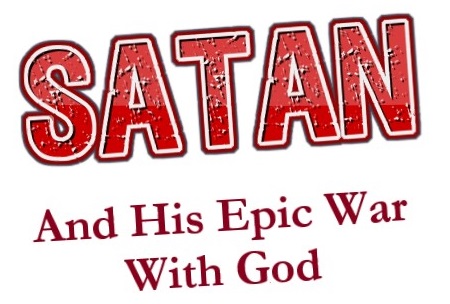Satan (Part 17) - The Epic War: The 2nd War in Heaven, Satan Bound
Submitted by Pastor Chad Wagner on Sunday, December 23, 2018.


4. The second war in heaven A. After Jesus Christ ascended to His throne after His resurrection (Rev 12:5) there was a second war in heaven (Rev 12:7). B. Satan and his angels lost this war (Rev 12:8). C. This resulted in the second casting of Satan in which he was cast into the earth and forever barred from heaven (Isa 14:12; Eze 28:17; Rev 12:8-9). D. Satan had been cast out of heaven prior to the garden of Eden (Luk 10:18), but he still had access to heaven to accuse the saints (Job 1:6-12). E. The second casting out of Satan happened after Christ's resurrection (Joh 12:31). F. Satan no longer has access to heaven to accuse the brethren (Rev 12:10). i. Satan is the accuser of the brethren, a sort of prosecuting attorney. ii. When Christ died on the cross, He took away the sins of His elect which were the reason for their condemnation (Rom 8:1). iii. Nobody, including Satan, can lay anything to the charge of God's elect because Christ justified them (Rom 8:33). iv. Satan can no longer condemn us because Jesus Christ is at the right hand of God making intercession for us as our defense attorney (Rom 8:34). v. Jesus is our advocate who pleads for our innocence because of His propitiation (1Jo 2:1-2). vi. He ever lives to make intercession for us (Heb 7:25), and therefore Satan will never again have access to heaven to accuse us before God. G. The kingdom of God had triumphed over the kingdom of Satan (Rev 12:10). 5. Satan is bound so that he cannot deceive the nations as he had done prior to the coming of Christ. A. When Jesus was crucified and raised from the dead He spoiled principalities and powers (Col 2:14-15). i. Spoil v. - I. 1. a. trans. To strip or despoil (a dead or helpless person); esp. to strip (a defeated or slain enemy) of arms and armour. ii. Satan is the prince of the wicked principalities and powers (Mat 12:24; Eph 2:2; Joh 12:31). iii. Beelzebub - The Devil; a devil; iv. Therefore, Jesus spoiled Satan by His death and resurrection. v. Jesus destroyed Satan and his works through His death (Heb 2:14; 1Jo 3:8). B. In order for Jesus to spoil Satan, He must first have bound him (Mat 12:29). i. Jesus is the angel who bound Satan at His first coming (at His resurrection) (Rev 20:1-2). ii. Jesus is called the messenger (angel) of the covenant (Mal 3:1). iii. Angel - I. 1. a. A ministering spirit or divine messenger iv. Jesus has the key of the bottomless pit (hell and death) (Rev 1:17-18 c/w Rev 20:1). C. Though Satan is bound, he is not completely immobilized. i. A person can be bound and yet still have a measure of liberty, such as in the following cases: a. Paul in Roman custody (Act 24:23-27) b. Joseph in prison in Egypt (Gen 39:22 c/w Gen 40:3-4) c. Marriage (1Co 7:27) ii. This is the case with Satan; his binding is specific: "that he should deceive the nations no more" (Rev 20:3). a. The nations is synonymous with the Gentiles in scripture (Rom 15:10 c/w Deu 32:43). b. Prior to the coming of Christ, God only dealt with one nation, Israel (Psa 147:19-20). c. All the other nations were left to walk in darkness (Eph 2:12; Eph 4:17-18) d. At that time the Gentiles were devil worshipers (1Co 10:20). iii. With Satan bound so that he could deceive the nations no more, the gospel then went to the Gentiles (Mat 28:19). a. Prior to the coming of Christ, God turned a blind eye to Gentile idolatry, but now commands all men everywhere to repent (Act 14:16; Act 17:29-30). b. With Satan bound, the Gentiles could be converted from the grip of his power unto God (Act 26:18).
